- Home
- Thomas Harris
Red Dragon hl-1 Page 22
Red Dragon hl-1 Read online
Page 22
Dolarhyde freezes the frame. He backs up the film. Again and again she turns from the mirror and smiles.
Absently Dolarhyde picks up the film of the softball game and drops it in the wastebasket.
He takes the reel from the projector and looks at the Gateway label on the box: Bob Sherman, Star Route 7, Box 603, Tulsa, Okla.
An easy drive, too.
Dolarhyde holds the film in his palm and covers it with his other hand as though it were a small living thing that might struggle to escape. It seems to jump against his palm like a cricket.
He remembers the jerkiness, the haste at theLeedshouse when the lights came on. He had to deal with Mr. Leeds before turning on his movie lights.
This time he wants a smoother progression. It would be wonderful to crawl in between the sleepers with the camera going and snuggle up a little while. Then he could strike in the dark and sit up between them happily getting wet.
He can do that with infrared film, and he knows where to get some.
The projector is still on. Dolarhyde sits holding the film between his hands while on the bright blank screen other images move for him to the long sigh of the wind.
There is no sense of vengeance in him, only Love and thoughts of the Glory to come; hearts becoming faint and fast, like footsteps fleeing into silence.
Him rampant. Him rampant, filled with Love, theShermansopening to him.
The past does not occur to him at all; only the Glory to come. He does not think of his mother’s house. In fact, his conscious memones of that time are remarkably few and indistinct.
Sometime in his twenties Dolarhyde’s memories of his mother’s house sank out of sight, leaving a slick on the surface of his mind.
He knew that he had lived there only a month. He did not recall that he was sent away at the age of nine for hangingVictoria’s cat.
One of the few images he retained was the house itself, lighted, viewed from the street in winter twilight as he passed it going fromPotterGerardElementary Schoolto the house where he was boarded a mile away.
He could remember the smell of the Vogt library, like a piano just opened, when his mother received him there to give him holiday things. He did not remember the faces at the upstairs windows as he walked away, down the frozen sidewalk, the practical gifts burning hateful under his arm; hurrying home to a place inside his head that was quite different fromSt. Louis.
At the age of eleven his fantasy life was active and intense and when the pressure of his Love grew too great, he relieved it. He preyed on pets, carefully, with a cool eye to consequence. They were so tame that it was easy. The authorities never linked him with the sad little bloodstains soaked into the dirt floors of garages.
At forty-two he did not remember that. Nor did he ever think about the people in his mother’s house—his mother, stepsisters, or stepbrother.
Sometimes he saw them in his sleep, in the brilliant fragments of a fever dream; altered and tall, faces and bodies in bright parrot colors, they poised over him in a mantis stance.
When he chose to reflect, which was seldom, he had many satisfactory memories. They were of his military service.
Caught at seventeen entering the window of a woman’s house for a purpose never established, he was given the choice of enlisting in the Army or facing criminal charges. He took the Army.
After basic training he was sent to specialist school in darkroom operation and shipped toSan Antonio, where he worked on medical-corps training films atBrookeArmyHospital.
Surgeons at Brooke took an interest in him and decided to improve his face.
They performed a Z-plasty on his nose, using ear cartilage to lengthen the columella, and repaired his lip with an interesting Abbé flap procedure that drew an audience of doctors to the operating theater.
The surgeons were proud of the result. Dolarhyde declined the mirror and looked out the window.
Records at the film library show Dolarhyde checked out many films, mainly on trauma, and kept them overnight.
He reenlisted in 1958 and in his second hitch he foundHong Kong. Stationed atSeoul,Korea, developing film from the tiny spotter planes the Army floated over the thirty-eighth parallel in the late 1950’s, he was able to go toHong Kongtwice on leave. Hong Kong andKowlooncould satisfy any appetite in 1959.
Grandmother was released from the sanatorium in 1961 in a vague Thorazine peace. Dolarhyde asked for and received a hardship discharge two months before his scheduled separation date and went home to take care of her.
It was a curiously peaceful time for him as well. With his new job at Gateway, Dolarhyde could hire a woman to stay with Grandmother in the daytime. At night they sat in the parlor together, not speaking. The tick of the old clock and its chimes were all that broke the silence.
He saw his mother once, at Grandmother’s funeral in 1970. He looked through her, past her, with his yellow eyes so startlingly like her own. She might have been a stranger.
His appearance surprised his mother. He was deep-chested and sleek, with her fine coloring and a neat mustache which she suspected was hair transplanted from his head.
She called him once in the next week and heard the receiver slowly replaced.
* * *
For nine years after Grandmother’s death Dolarhyde was untroubled and he troubled no one. His forehead was as smooth as a seed. He knew that he was waiting. For what, he didn’t know.
One small event, which occurs to everyone, told the seed in his skull it was Time: standing by a north window, examining some film, he noticed aging in his hands. It was as though his hands, holding the film, had suddenly appeared before him and he saw in that good north light that the skin had slackened over the bones and tendons and his hands were creased in diamonds as small as lizard scales.
As he turned them in the light, an intense odor of cabbage and stewed tomatoes washed over him. He shivered though the room was warm. That evening he worked out harder than usual.
A full-length mirror was mounted on the wall of Dolarhyde’s attic gym beside his barbells and weight bench. It was the only mirror hanging in his house, and he could admire his body in it comfortably because he always worked out in a mask.
He examined himself carefully while his muscles were pumped up.
At forty, he could have competed successfully in regional body-building competition. He was not satisfied.
Within the week he came upon the Blake painting. It seized him instantly.
He saw it in a large, full-color photograph in Time magazine illustrating a report on the Blake retrospective at theTateMuseuminLondon. TheBrooklynMuseumhad sent The Great Red Dragon and the Woman Clothed with the Sun toLondonfor the show.
Time’s critic said: “Few demonic images in Western art radiate such a nightmarish charge of sexual energy…” Dolarhyde didn’t have to read the text to find that out.
He carried the picture with him for days, photographed and enlarged it in the darkroom late at night. He was agitated much of the time. He posted the painting beside his mirror in the weight room and stared at it while he pumped. He could sleep only when he had worked out to exhaustion and watched his medical films to aid him in sexual relief.
He had known since the age of nine that essentially he was alone and that he would always be alone, a conclusion more common to the forties.
Now, in his forties, he was seized by a fantasy life with the brilliance and freshness and immediacy of childhood. It took him a step beyond Alone.
At a time when other men first see and fear their isolation, Dolarhyde’s became understandable to him: he was alone because he was Unique. With the fervor of conversion he saw that if he worked at it, if he followed the true urges he had kept down for so long-cultivated them as the inspirations they truly were—he could Become.
The Dragon’s face is not visible in the painting, but increasingly Dolarhyde came to know how it looked.
Watching his medical films in the parlor, pumped up from lifting, he stretched his jaw wide
to hold in Grandmother’s teeth. They did not fit his distorted gums and his jaw cramped quickly.
He worked on his jaw in private moments, biting on a hard rubber block until the muscles stood out in his cheeks like walnuts.
In the fall of 1979, Francis Dolarhyde withdrew part of his considerable savings and took a three-month leave of absence from Gateway. He went toHong Kongand he took with him his grandmother’s teeth.
When he returned, red-haired Eileen and his other fellow workers agreed that the vacation had done him good. He was calm. They hardly noticed that he never used the employees’ locker room or shower anymore—he had never done that often anyway.
His grandmother’s teeth were back in the glass beside her bed. His own new ones were locked in his desk upstairs.
If Eileen could have seen him before his mirror, teeth in place, new tattoo brilliant in the harsh gym light, she would have screamed. Once.
There was time now; he did not have to hurry now. He had forever. It was five months before he selected the Jacobis.
The Jacobis were the first to help him, the first to lift him into the Glory of his Becoming. The Jacobis were better than anything, better than anything he ever knew.
Until the Leedses.
And now, as he grew in strength and Glory, there were theShermansto come and the new intimacy of infrared. Most promising.
Chapter 29
Francis Dolarhyde had to leave his own territory at Gateway Film Processing to get what he needed.
Dolarhyde was production chief of Gateway’s largest division—home-movie processing—but there were four other divisions.
The recessions of the 1970’s cut deeply into home moviemaking, and there was increasing competition from home video recorders. Gateway had to diversify.
The company added departments which transferred film to video-tape, printed aerial survey maps, and offered custom services to small-format commercial filmmakers.
In 1979 a plum fell to Gateway. The company contracted jointly with the Department of Defense and the Department of Energy to develop and test new emulsions for infrared photography.
The Department of Energy wanted sensitive infrared film for its heat-conservation studies. Defense wanted it for night reconnaissance.
Gateway bought a small company next door, Baeder Chemical, in late 1979 and set up the project there.
Dolarhyde walked across to Baeder on his lunch hour under a scrubbed blue sky, carefully avoiding the reflecting puddles on the asphalt, Lounds’s death had put him in an excellent humor.
Everyone at Baeder seemed to be out for lunch.
He found the door he wanted at the end of a labyrinth of halls. The sign beside the door said “Infrared Sensitive Materials in Use. NO Safelights, NO Smoking, NO hot beverages.” The red light was on above the sign.
Dolarhyde pushed a button and, in a moment, the light turned green. He entered the light trap and rapped on the inner door.
“Come.” A woman’s voice. Cool, absolute darkness. The gurgle of water, the familiar smell of D-76 developer, and a trace of perfume.
“I’m Francis Dolarhyde. I came about the dryer.”
“Oh, good. Excuse me, my mouth’s full. I was just finishing lunch.”
He heard papers wadded and dropped in a wastebasket.
“Actually,Fergusonwanted the dryer,” said the voice in the dark.
“He’s on vacation, but I know where it goes. You have one over at Gateway?”
“I have two. One is larger. He didn’t say how much room he has.” Dolarhyde had seen a memo about the dryer problem weeks ago.
“I’ll show you, if you don’t mind a short wait.”
“All right.”
“Put your back against the door”—her voice took on a touch of the lecturer’s practiced tone—“come forward three steps, until you feel the tile under your feet, and there’ll be a stool just to your left.”
He found it. He was closer to her now. He could hear the rustle of her lab apron.
“Thanks for coming down,” she said. Her voice was clear, with a faint ring of iron in it. “You’re head of processing over in the big building, right?”
“Um-humm.”
“The same ‘Mr. D.’ who sends the rockets when the requisitions are filed wrong?”
“The very one.”
“I’m Reba McClane. Hope there’s nothing wrong over here.”
“Not my project anymore. I just planned the darkroom construction when we bought this place. I haven’t been over here in six months.” A long speech for him, easier in the dark.
“Just a minute more and we’ll get you some light. Do you need a tape measure?”
“I have one.” Dolarhyde found it rather pleasant, talking to the woman in the dark. He heard the rattle of a purse being rummaged, the click of a compact.
He was sorry when the timer rang.
“There we go. I’ll put this stuff in the Black Hole,” she said.
He felt a breath of cold air, heard a cabinet close on rubber seals and the hiss of a vacuum lock. A puff of air, and fragrance touched him as she passed.
Dolarhyde pressed his knuckle under his nose, put on his thoughtful expression and waited for the light.
The lights came on. She stood by the door smiling in his approximate direction. Her eyes made small random movements behind the closed lids.
He saw her white cane propped in the corner. He took his hand away from his face and smiled.
“Do you think I could have a plum?” he said. There were several on the counter where she had been sitting.
“Sure, they’re really good.”
Reba McClane was about thirty, with a handsome prairie face shaped by good bones and resolution. She had a small star-shaped scar on the bridge of her nose. Her hair was a mixture of wheat and red-gold, cut in a pageboy that looked slightly out-of-date, and her face and hands were pleasantly freckled by the sun. Against the tile and stainless steel of the darkroom she was as bright as Fall.
He was free to look at her. His gaze could move over her as freely as the air. She had no way to parry eyes.
Dolarhyde often felt warm spots, stinging spots on his skin when he talked to a woman. They moved over him to wherever he thought the woman was looking. Even when a woman looked away from him, he suspected that she saw his reflection. He was always aware of reflective surfaces, knew the angles of reflection as a pool shark knows the banks.
His skin now was cool. Hers was freckled, pearly on her throat and the insides of her wrists.
“I’ll show you the room where he wants to put it,” she said. “We can get the measuring done.”
They measured.
“Now, I want to ask a favor,” Dolarhyde said.
“Okay.”
“I need some infrared movie film. Hot film, sensitive up around one thousand nanometers,”
“You’ll have to keep it in the freezer and put it back in the cold after you shoot.”
“I know.”
“Could you give me an idea of the conditions, maybe I—”
“Shooting at maybe eight feet, with a pair of Wratten filters over the lights.” It sounded too much like a surveillance rig. “At the zoo,” he said. “In the World of Darkness. They want to photograph the nocturnal animals.”
“They must really be spooky if you can’t use commercial infra-red.”
“Ummm-hmmmm.”
“I’m sure we can fix you up. One thing, though. You know a lot of our stuff is under the DD contract. Anything that goes out of here; you have to sign for.”
“Right.”
“When do you need it?”
“About the twentieth. No later.”
“I don’t have to tell you—the more sensitive it is, the meaner it is to handle. You get into coolers, dry ice, all that. They’re screening some samples about four o’clock, if you want to look. You can pick the tamest emulsion that’ll do what you want.”
“I’ll come.”
Reba McClane counted h
er plums after Dolarhyde left. He had taken one.
Strange man, Mr. Dolarhyde. There had been no awkward pause of sympathy and concern in his voice when she turned on the lights. Maybe he already knew she was blind. Better yet, maybe he didn’t give a damn.
That would be refreshing.
Chapter 30
InChicago, Freddy Lounds’s funeral was under way. The National Tattler paid for the elaborate service, rushing the arrangements so that it could be held on Thursday, the day after his death. Then the pictures would be available for the Tattler edition published Thursday night.
The funeral was long in the chapel and it was long at the grave-side.
A radio evangelist went on and on in fulsome eulogy. Graham rode the greasy swells of his hangover and tried to study the crowd.
The hired choir at graveside gave full measure for the money while the Tattler photographers’ motor-driven cameras whizzed. Two TV crews were present with fixed cameras and creepy-peepies. Police photographers with press credentials photographed the crowd.
Graham recognized several plainclothes officers from Chicago Homicide. Theirs were the only faces that meant anything to him.
And there was Wendy of Wendy City, Lounds’s girlfriend. She was seated beneath the canopy, nearest the coffin. Graham hardly recognized her. Her blonde wig was drawn back in a bun and she wore a black tailored suit.
During the last hymn she rose, went forward unsteadily, knelt and laid her head on the casket, her arms outstretched in the pall of chrysanthemums as the strobe lights flashed.
The crowd made little noise moving over the spongy grass to the cemetery gates.
Graham walked beside Wendy. A crowd of the uninvited stared at them through the bars of the high iron fence.
“Are you all right?” Graham asked.
They stopped among the tombstones. Her eyes were dry, her gaze level.
“Better than you,” she said. “Got drunk, didn’t you?”
“Yep. Is somebody keeping an eye on you?”

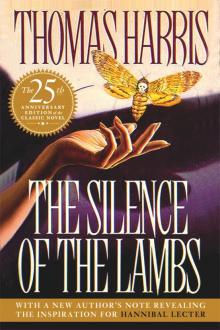 The Silence of the Lambs
The Silence of the Lambs Red Dragon
Red Dragon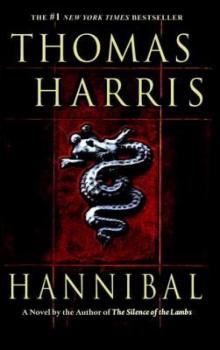 Hannibal
Hannibal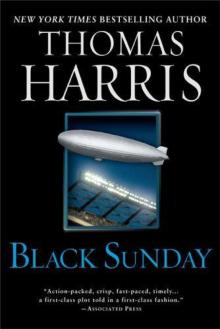 Black Sunday
Black Sunday Cari Mora
Cari Mora Hannibal Rising
Hannibal Rising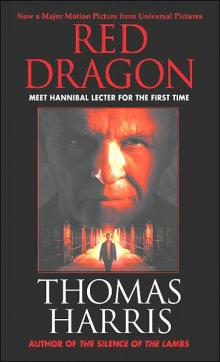 Red Dragon hl-1
Red Dragon hl-1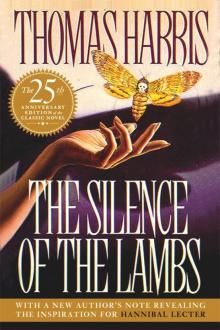 The Silence of the Lambs (Hannibal Lecter)
The Silence of the Lambs (Hannibal Lecter)